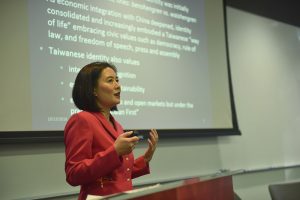Chinese University of Hong Kong professor examines China-Taiwan relations
Syaru Shirley Lin, a professor of global political economy at Chinese University of Hong Kong and professor of political science at University of Virginia, spoke about cross-strait economic and political relations between China and Taiwan at Wallis Annenberg Hall on Thursday.
Prior to her teaching years, Lin was an investment banker in Hong Kong.
The USC US-China Institute hosted the talk by Lin to introduce her book Taiwan’s China Dilemma: Contested Identities and Multiple Interests in Taiwan’s Cross-Strait Economic Policy. Lin used this opportunity to explore different ideas she presents in her book including Taiwan’s national identity and how Taiwan’s China policy has been oscillating and moderating over time since former Taiwan President Lee Tung-hui.
Lin revealed to her audience that the title of her book was changed during the last stage of her writing. She came up with the final title to her book from realizing China’s considerable influence and ties among many countries.
“Every country has their own China dilemma,” Lin said.
During the talk, Lin explored the history of Taiwan’s economic situation and how Taiwanese identity has valued international recognition and environmental sustainability.
Despite the increase in trade in Taiwan since President Ma Ying-jeou’s term in Taiwan, Lin acknowledged that the benefits have been inconsistent in the last 10 years.
“Everyone understands that the most important relation between China and Taiwan is not trade, but investment … In Taiwan’s case, it’s based on foreign investment,” Lin said during the presentation.
Lin used several graphs to point out Taiwan’s economic benefit from the 1980s to present day. She tied the slow growth to the complication of doing business with China, a neighbor that is competent of absorbing Taiwan.
“To the Taiwanese, China is both a threat and an opportunity,” Lin said.
Summarizing her talk about Taiwan’s current economic problems, Lin mentioned that Taiwan’s economic problems are blamed on China rather than globalization.
Lin explained that even with the new trade policies with China, the Taiwanese are irrational and inconsistent in their attitudes toward China. While this domestic debate continues to take place in Taiwan, China’s GDP continues to grow.
Continuing to talk about trade, Lin mentioned her disbelief of how the policies adopted by each president since Taiwan rose from martial law years ago has been different.
“Looking at the politics of trade, winners and losers, it’s a mystery to me why in 1996 Lee Tung-hui would restrict investing in China and why Chen would want to liberalize policy towards China,” Lin said. “It didn’t add up to the data on hand.”
Lin noted thought that Taiwanese national identity has strengthened since Tung-hui. Taiwanese identity was initially polarized along ethnic lines: waishenren vs ‘benshenren.’
With democratization in Taiwan in the recent decade, the differences have decreased.
“Taiwanese identity like many other emerging communities were focused on ethical lines,” Lin said. “Over 52% of Taiwanese believed they were only ‘Chinese’ in 1989 … 30 years is a really short period of time, and no one in Taiwan could tell you this is what we would see today,” Lin said.
This polarized identity has mainly caused changes in Taiwan’s China policy. Lin explained that Taiwanese identity consolidated and increasingly embodied a Taiwanese way of life, embracing values such as democracy, rule of law, freedom of speech, press and assembly.
Ending her talk, Lin analyzed the challenges facing Taiwan’s recently elected president, Tsai Ing-wen. Lin anticipated that Tsai must continue managing cross-strait relations while creating domestic support and consensus.
Lin mentioned that Taiwan is currently facing its own big problems outside of China.
Like with Hong Kong, Taiwan is currently falling into what is called the “High Income Trap.”
“Taiwan is experiencing high unemployment rate amongst Taiwanese youth, stagnant real wages and rising property values. The high interest rate environment does not help … it has led to high housing price,” Lin said.
While Taiwan has been increasingly polar on agreeing on its national identity and solving its China dilemma, Lin notably points out that China’s focus right now isn’t necessarily only on Taiwan.
“China is focusing on its own China dilemma,” Lin said.

